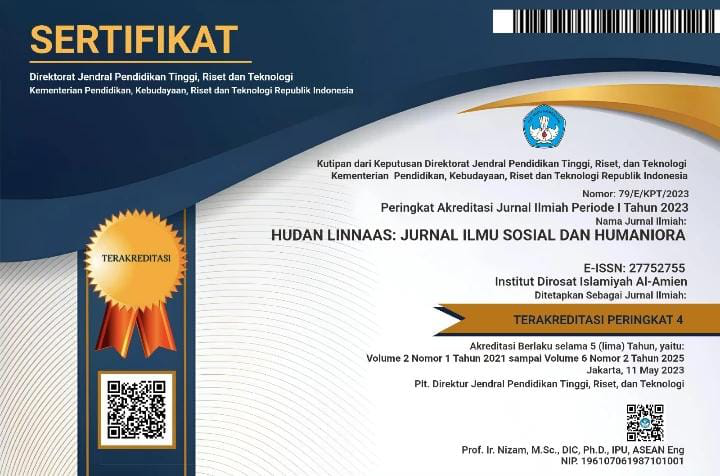TASAWUF DAN JIHAD CINTA TANAH AIR DALAM KETELADANAN AL-PALIMBANI
Abstract
The term of “Jihad†or “Jihad fi Sabilillah†is often become an interesting theme to attract attention from some people, either inside Islam or outside this religious community. Apart from the pros and cons in a case of religiousity, study of Jihad is also fulfilled with theological overview, meaning, procedure, and examples. Contrary to Jihad, Tasawuf / Sufism, so far, considered as negation term and relatively tend to be liked caused of its mystical (esoteric) impression and universal love. However, Islamic History contains the facts of involvement of Sufis in waging Jihad actions, some names like Sheikh Yusuf Al-Maqassari and the most noted one, Sheikh Abdus Shamad Al-Palimbani, were two prominent figures that well known as “Warrior Clericâ€. Library research method is deployed in this article to answer three main questions : 1) How is the relationship between Sufism and Jihad ?, 2) How was the role of Sheikh Abdus Shamad Al-Palimbani in Indonesian archipelago’s Jihad activism ?, and, 3) What is the impact of Sufi’s Jihad activism toward Indonesia ?. This research proves the involvement of Sufis in Indonesian archipelago Jihads were based on Quranic value to honor the safety of bloods and properties belonged to people, with the result that Jihad in the term of ‘Qital’ / Warfare is a defensive reaction not an aggressive action, keep obeying to ‘Ulil Amri (legitimate government) not subversive-terror movement, and not based on hatred for other religious adherents. Such an essential meaning of this Jihad even formed a sense of Godly love for the country in accordance with Islamic mission of Rahmatan lil-‘alamin (mercy for the whole world).
Â
Keywords : Jihad, Sufism, Love for the country, Sheikh Abdus Shamad Al-Palimbani
Keywords
References
Abdullah, Mal An. 2015. Syaikh Abdus-Samad Al-Palimbani. Yogyakarta : Pustaka Pesantren.
Agung D.H. 2011. Khadafi : Anjing Gila dari Sahara. Yogyakarta : Penerbit Narasi.
Armstrong, Karen. 2013. Berperang Demi Tuhan : Fundamentalisme dalam Islam, Kristen, dan Yahudi. Bandung : Mizan.
Bokhari, Raana, Mohammad Seddon. 2011. Ensiklopedia Islam. Jakarta : Penerbit Erlangga.
Bosworth, C.E. 1993. Dinasti-dinasti Islam. Bandung : Mizan.
Bruinessen, Martin van. 1998. Tarekat Naqsyabandiyah di Indonesia. Bandung : Mizan.
Iqbal, Muhammad. 2001. Fiqh Siyasah : Kontekstualisasi Doktrin Politik Islam. Jakarta : Penerbit Gaya Media Pratama.
Irwanto, Dedi, Alian Sair. 2014. Metodologi dan Historiografi Sejarah : Cara Cepat Menulis Sejarah. Yogyakarta : Eja¬¬¬_Publisher.
Maarif, Syafii. 2005. Meluruskan Makna Jihad (Kumpulan Khutbah Jumat). Jakarta : Center for Moderate Muslim (CMM).
Majalah Alkisah No.16 / 10-23 Agustus 2009.
Majalah Islam Sabili Edisi Khusus “Sejarah Emas Muslim Indonesia†No. 9 Th. X 2003.
Misrawi, Zuhairi. 2010. Hadratussyaikh Hasyim Asy’Ari : Moderasi, Keumatan, dan Kebangsaan. Jakarta : Penerbit Buku Kompas.
Al-Palimbani, Syaikh Abdus Shamad, Kms. H. Andi Syarifuddin (Ed.). 2013. Hidayatus Shalikin. Surabaya : Pustaka Hikmah Persada.
Pramasto, Arafah. "Pengaruh Sosial-Politik dan Intelektual dalam Pembentukan Neo-Sufisme Imam Al-Ghazali". Al-Mabsut Vol. 13 No. 2 September (2019) : 101-114.
Pulungan, Suyuthi. 2019. Sejarah Pendidikan Islam. Jakarta : Penertbit Kencana.
Priyadi, Sugeng. 2012. Metode Penelitian Pendidikan Sejarah. Yogyakarta : Ombak.
Suito, Deny. 2005. Radikalisme di Dunia Islam. Jakarta : Center for Moderate Muslim.
Umar, Nasaruddin. 2014. Tasawuf Modern. Jakarta : Penerbit Republika.
DOI: 10.28944/hudanlinnaas.v3i1.560
Refbacks
- There are currently no refbacks.

This work is licensed under a Creative Commons Attribution-NonCommercial-ShareAlike 4.0 International License.







.png)